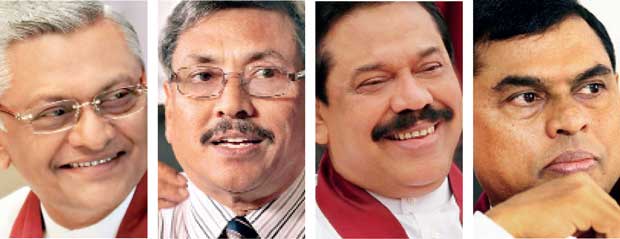Reply To:
Name - Reply Comment

 “The lust of avarice has so totally seized upon mankind that their wealth seems rather to possess them than they possess their wealth.”
“The lust of avarice has so totally seized upon mankind that their wealth seems rather to possess them than they possess their wealth.”
-Pliny the Elder
The guns fell silent. Victory cries echoed in the skies while jubilant Sri Lankans celebrated the war victory with Kiribath (milk-rice), Lunu-Miris (chili-peppered onion-chutney) and plain tea. The country at large, those who lived South of Vavuniya, claimed, in all rightful sense, a historic military victory over the forces of Tamil extremists who brought unspeakable terror, anguish, pain and death to many a Sinhalese-Buddhist community. The celebrations were justifiable; the claims were authentic and lofty hopes for the dawn of a new era with peace, prosperity and stability reached beyond the frontiers of reality. That was May 19, 2009. Now it looks so far and distant and the victory’s gleaming rays have paled into the dim-light of time.
People’s priorities changed; victors were rejected by the very people who hailed a modern Caesar who did not fire a single bullet nor stopped one to shield the brother-soldier behind; the field commander who marshalled his men, the commander who planned and designed every single attack and counter-attack, the commander who led his brave soldiers in the trenches, the commander who nearly died from a suicide-bomber attack, became the first victim of the peace.
From 1994 to 2014, twenty long years, on the military side, were filled with stories of great bravery; yet they were filled with unspeakable grief for innocent masses of our land who lived on the South side of Vavuniya. They tell a story of a nation, at times meandering between what to do and what not to, sometimes making advances on the battlefield and retreating at other times, a tale of utter disbelief when their children did not come home on time; of tormented residents along border villages not knowing whether they would live or die the night they went to sleep, these were the years some would like to forget, yet they would be etched in their memories for a long time. The political leadership provided at that time switched from a Bandaranaike to a Rajapaksa. But the pattern of politics did not change.
The Sri Lanka Freedom Party (SLFP) carried on with their caravan of populist measures on the economy and ultra-nationalist on the socio-ethnic issues. The policies and postures so adopted portrayed a regime hell-bent on teaching a lesson, not only to a terrorist army, but also to a segment of our own people, Tamil civilians. These are the years in which an emotion against terrorism turned into a war against a whole people. The divide between the Sinhalese and Tamils took root and those who controlled the coffers of the country controlled the mass psyche.
The tragic feature of this period is that no politician, no pundit, no NGO, no state institution, no civil organisation, no media outlet, no segment of the clergy, took notice of the fact that the nation’s character is receiving irrevocable alteration, its culture being debased, its inner-soul being consumed by the marketplace, its education being neglected beyond any chance of a ‘correction’ and its role-model politicians were wining dining and in five-star hotels in the company of that new class of crony-capitalists. It was indeed a spectacle of macabre consumerism. Those political icons who used to pontificate about the purity of our cultural values have discarded those very values like early-morning spit. And when the Rajapaksas assumed the mantle of power after Chandrika Kumaranatunga Bandaranaike, all focus was on the war in the North and thanks mainly to the incredible leadership of the commanders on the field and adequate political leadership at the centre, the dreaded Prabhakaran and his Liberation Tigers of Tamil Elam passed into history.
The first decade of the 21st century represented some of the best and worst in our short history from independence to present. The beginnings of the winds of victory are lost in the reeking mists of corruption, nepotism and cruelty. This land of ours has a long history, a history that is rich with magnificent kings and reasonably-steadfast democratic rulers; her history could boast about being magnanimous in victory because her victorious kings decreed that her subjects adhered to noble rituals of respecting defeated enemy-kings, her history built colossal stupas upon the sacredness of the teachings of the Thathagatha, the Enlightened One. For the first time in her long and cherished history, she submitted herself to the rule of ‘Four Brothers.’ The eldest was the Speaker of the House; next was the President and the other two controlled the most vital sectors of the country, defence and the economy. Among themselves was disbursed nearly 70% of the country’s budget.
When the President undertook overseas visits, his entourage of henchmen and court jesters were in hundreds.
Meanwhile, the country was being buried in a stampede of propaganda. A leader elected by the people was being promoted as a Monarch. Some media-henchmen in fact addressed him as such - ‘Your Royal Highness.’ The country’s intelligentsia went to deep sleep; religious leaders, barring a handful, deified President Rajapaksa; his family, the ‘First Family.’ The era of the rule of the ‘Four Brothers’ began in earnest. Those who willingly pandered to that gory fantasy today have ended up as the ‘Joint Opposition’ (JO).
Bereft of any traditional values, these ‘merchants of corruption and dishonesty’ could no longer keep trading; the real value of their ‘stocks in trade’ began diminishing. Provincial Council elections were held in Sri Lanka on September 20, 2014 to elect 34 members in the Uva Province. The SLFP, led by the Rajapaksas, retained control; however, the UPFA recorded a loss of votes in the province, clearly providing the United National Party (UNP) with a probable chance to make an unfamiliar comeback. Despite this unusual setback, President Rajapaksa decided to go for Presidential Elections in early January 2015. Such was the arrogance of power of the ‘Four Brothers.’ Their cockiness knew no bounds.
Who is responsible for this? There is no answer pointing to one single cause. We mundane folks are merely looking for one single reason, one single phenomenon. But history has shown us that it is utterly futile to look for such single answers. For the Roman Empire to fall, for Hitler to lose the war, for the collapse of the Marxist-Communist world, for that matter, for occurrence of any significant event in history, a combination of multiple reasons and causes is imperative. While one single cause may not be indispensable for occurrence of the event, the absence of that particular cause also might be significant enough not to produce the ultimate effect in history. That is why history has proven to be a graveyard for amateurs. I do not want to dwell amongst them.
It would be apt to end this the 1st part of the ‘Four Brothers’ with a quotation from Zeno of Elea, a pre-Socratic Greek philosopher, whom Aristotle called the inventor of the dialectic: “The avaricious man is like the barren sandy ground of the desert which sucks in all the rain and dew with greediness, but yields no fruitful herbs or plants for the benefit of others.”
To be continued next Wednesday…